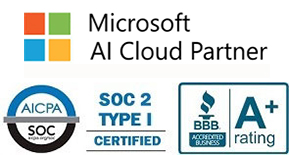IT Consulting | IT Support | Managed Services | New Jersey Computer Support Services

Choosing the right IT support model can make or break your business. If you are unsure whether IT outsourcing or Managed Services is right for your business, consider the following factors.
As technology becomes increasingly complex, it is more crucial than ever to understand the distinctions between IT outsourcing and managed services. This comparison will help you understand both approaches and determine which best fits your business needs, budget, and growth plans.
What is IT Outsourcing?
IT outsourcing is a reactive approach where external providers are temporarily engaged to manage specific IT tasks or projects, addressing issues as they emerge rather than proactively preventing them.
Companies typically use IT outsourcing for one-time projects like server installations, software implementations, or emergency repairs. The relationship is transactional, with providers charging fees based on the scope and complexity of each project.
More and more companies are outsourcing their IT; the IT outsourcing market is estimated to reach USD 245.29 billion by 2030.
What are Managed Services?
Managed services is an ongoing partnership where a Managed Service Provider (MSP) takes responsibility for your entire IT infrastructure. This proactive model focuses on monitoring, maintaining, and optimizing your systems before issues occur.
MSPs provide continuous oversight through 24/7 monitoring, regular maintenance, and strategic planning. The relationship is built on long-term collaboration, with predictable monthly fees covering all agreed-upon services.
A growing number of companies are seeing managed services as a necessity; the market value of MSPs is projected to grow 13.40% to 510.24 billion through 2029.
What Are the Key Differences Between IT Outsourcing and Managed Services
Understanding the differences between IT outsourcing vs. managed services will guide your decision.
-
Engagement Model: IT outsourcing relies on short-term contracts for specific needs, while managed services establish long-term partnerships focused on ongoing support.
-
Cost Structure: Outsourcing involves variable project-based fees that can fluctuate dramatically. Managed services offer predictable monthly subscriptions that simplify budgeting.
-
Support Approach: Outsourcing provides reactive fixes after problems occur. Managed services emphasize proactive monitoring and prevention to minimize downtime.
-
Scalability: Outsourcing offers limited flexibility for growing businesses. Managed services include built-in scalability that adapts as your company expands.
-
Control and Visibility: Outsourcing may reduce visibility into your IT operations. Quality MSPs act as an extension of your internal team, providing transparency and strategic guidance.
Pros and Cons of IT Outsourcing
Advantages: Lower initial costs make outsourcing attractive for businesses with smaller budgets. You gain access to specialized skills for specific projects without long-term commitments. This flexibility works well for one-off needs or companies with minimal IT requirements.
Disadvantages: Lack of consistency can disrupt operations when different providers handle various projects. Response times are typically slower since you're not a priority client. Hidden costs often emerge, and the reactive approach doesn't align with long-term business strategy.
Pros and Cons of Managed Services
Advantages: Predictable monthly costs eliminate budget surprises and enable better financial planning. 24/7 monitoring prevents issues before they impact operations. Enhanced security, built-in scalability, and ongoing strategic guidance support business growth.
Disadvantages: Monthly recurring costs may exceed immediate needs for very small businesses with minimal IT requirements. The scale of managed services might feel excessive if you only need occasional support.
Which Option is Right for Your Business?
The following factors can help guide your decision:
Business Size and Growth Plans: Growing companies benefit most from managed services' scalability and strategic support. Very small businesses with static IT needs might find outsourcing to be sufficient.
Industry Requirements: Compliance-heavy industries like healthcare and finance require the complete monitoring and security that managed services provide. The proactive approach ensures regulatory requirements are consistently met.
Budget Considerations: While managed services require ongoing monthly investment, they typically reduce overall IT costs by preventing expensive emergencies and downtime.
Support Philosophy: Choose managed services if you prefer preventing problems rather than fixing them. Select outsourcing if you're comfortable with a reactive approach to IT issues.
For New Jersey businesses seeking reliable IT support, managed services offer significant advantages over traditional outsourcing models. The predictable costs, proactive monitoring, and local expertise ensure your technology supports your business growth.
Take Control of Your IT Strategy
When considering IT outsourcing vs. managed services, take into account your business priorities, growth trajectory, and tolerance for IT-related disruptions. At Integrated Computer Services, we are a Microsoft Silver certified provider. We offer superior value for growing businesses through constant support, predictable costs, and strategic partnerships.
Are you ready to take control of your IT strategy? Contact our team for a technology assessment and discover the difference proactive IT management can make for your business.
SCHEDULE AN IT Assessment
About Us:
- 150+ 5-Star Google Rated IT Firm
- Microsoft Certified Cloud AI Partner
- SOC II Certified Managed Service Provider
- Better Business Bureau A+ Rated






